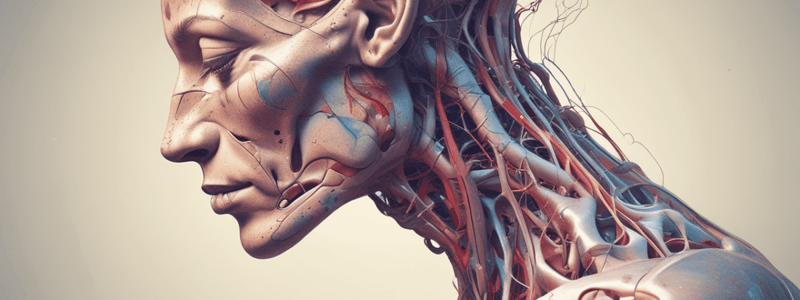Podcast
Questions and Answers
What percentage of cartilage is water?
What percentage of cartilage is water?
- 65-80% (correct)
- 90-100%
- 80-90%
- 40-50%
What gives cartilage its firmness and resilience?
What gives cartilage its firmness and resilience?
- Collagen
- Perichondrium
- Chondrocytes
- Matrix (correct)
What is the main component of the extracellular matrix (ECM) in cartilage?
What is the main component of the extracellular matrix (ECM) in cartilage?
- Proteoglycans
- Glycoproteins
- Collagen (correct)
- Water
What type of cartilage has a high proportion of amorphous matrix?
What type of cartilage has a high proportion of amorphous matrix?
Where is hyaline cartilage located in adults?
Where is hyaline cartilage located in adults?
What is the function of hyaline cartilage in joints?
What is the function of hyaline cartilage in joints?
What type of cartilage is found in the discs within joints?
What type of cartilage is found in the discs within joints?
What is the primary function of fibrocartilage in the human body?
What is the primary function of fibrocartilage in the human body?
Where are elastic cartilage, hyaline cartilage, and fibrocartilage likely to undergo calcification or ossification?
Where are elastic cartilage, hyaline cartilage, and fibrocartilage likely to undergo calcification or ossification?
What is the main characteristic of elastic cartilage?
What is the main characteristic of elastic cartilage?
What is the function of the cartilage lacuna?
What is the function of the cartilage lacuna?
What is the primary function of arteries in the vascular system?
What is the primary function of arteries in the vascular system?
What is characteristic of the walls of arteries?
What is characteristic of the walls of arteries?
Where are fibrocartilage and elastic cartilage commonly found in the human body?
Where are fibrocartilage and elastic cartilage commonly found in the human body?
What is the purpose of the glenoid labrum of the shoulder joint?
What is the purpose of the glenoid labrum of the shoulder joint?
Flashcards are hidden until you start studying
Study Notes
Cartilage
- Cartilage is a tough but flexible tissue that makes up 65-80% of water, although this decreases with age.
- The remaining 20-35% is a gel-like substance called the matrix, which gives cartilage its form and function.
- The perichondrium is a dense layer of fibrous connective tissue that covers many types of cartilage in the body.
- Cartilage is composed of a dense extracellular matrix (ECM) with a sparse distribution of highly specialized cells called chondrocytes.
- The ECM is principally composed of water, collagen, and proteoglycans, with other non-collagenous proteins and glycoproteins present in lesser amounts.
Types of Cartilage
- Hyaline Cartilage: has a high proportion of amorphous matrix, is the most widespread type, and plays an important part in the growth in length of long bones.
- Hyaline Cartilage Locations: articular surfaces of movable joints, walls of respiratory tracts (nose, larynx, trachea, and bronchi), costal cartilages, and epiphyseal plates of long bones.
- Fibrocartilage: has many collagen fibers embedded in a small amount of matrix, acts as a cushion within joints, and helps manage compression forces and reduces stress placed on joints.
- Fibrocartilage Locations: secondary cartilaginous joints (pubic symphysis, annulus fibrosis of intervertebral discs, etc.), medial and lateral menisci of the knee joint, tendons and ligaments attachment to bone, and Ulnar Triangular Fibrocartilage complex (TFCC).
- Elastic Cartilage: possesses large numbers of elastic fibers embedded in matrix, is flexible, and is found in the auricle of the ear, external auditory meatus, auditory tube, epiglottis, and tip of the nose.
Blood Vessels
- Blood Circulation: blood circulates inside closed transport systems.
- Types of Blood Vessels: arteries, arterioles, capillary beds, venules, and veins.
- Arteries: carry blood away from the heart, except for pulmonary circulation and umbilical vessels of a fetus; have thick muscular walls, lots of elastic tissue, relatively small lumen, and blood under high pressure with rapid and pulsatile flow.
- Artery Characteristics: no valves.
Studying That Suits You
Use AI to generate personalized quizzes and flashcards to suit your learning preferences.




